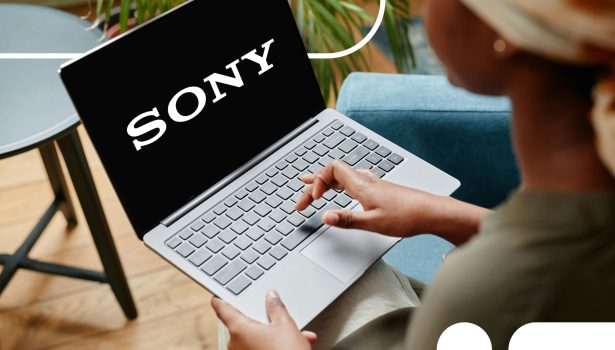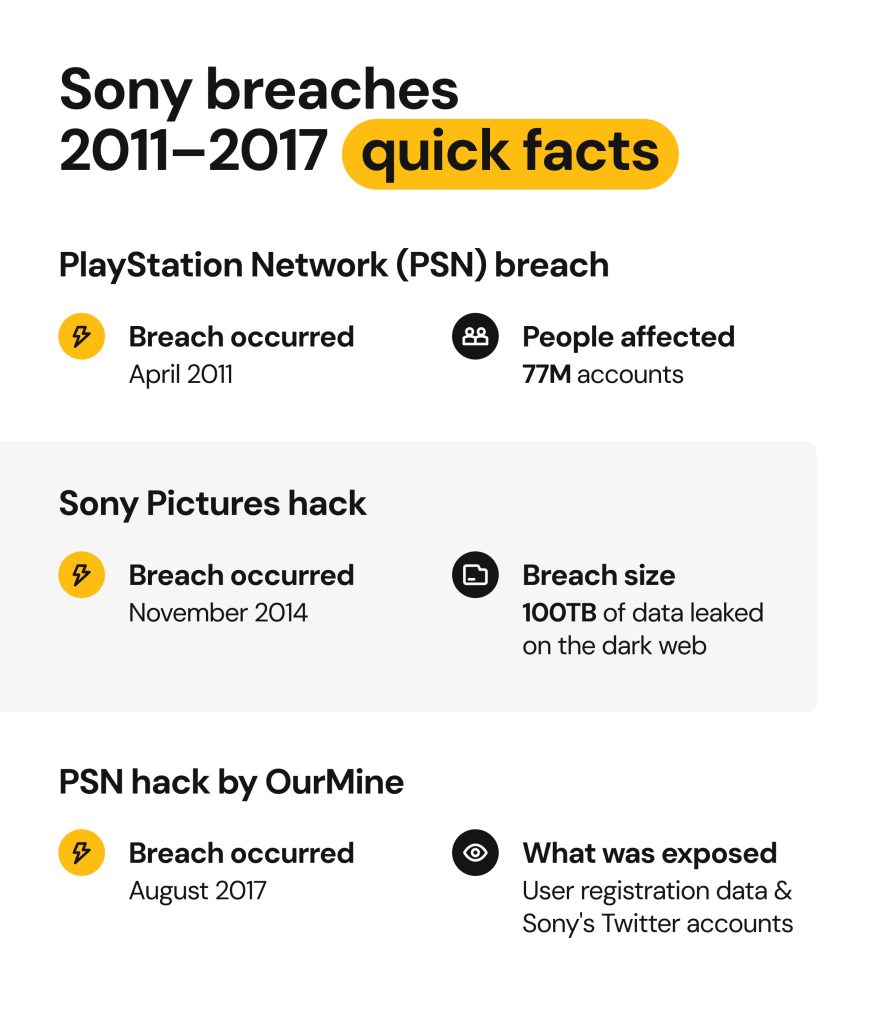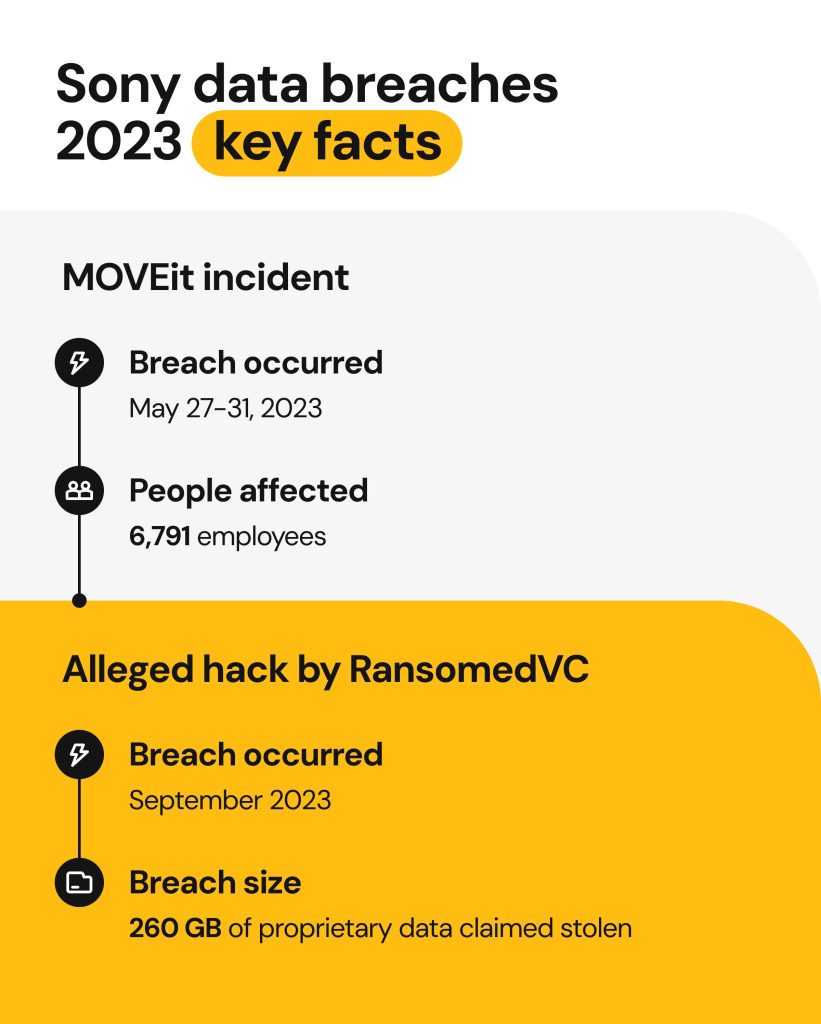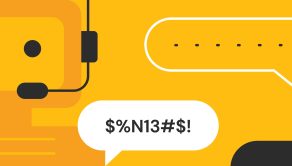Sony data breach: what happened and how to stay safe

Could gaming put your personal and financial information at risk? And can you imagine not having access to your favorite games for a month?
This is exactly what happened in the 2011 Sony data breach. The incident wasn’t the only security mishap the company endured: Sony was hacked again in 2014, 2017, and 2023. Millions of users had their sensitive information exposed, including employees, and cybercriminals even stole proprietary business information.
This article will explain what happened and how the Sony data breach incidents affected users around the world. It will also discuss what you can do to protect your data online, even beyond Sony’s platforms.
A long history of Sony data breaches
Sony has an extensive track record of cybersecurity incidents. Taken together, these events may suggest weak security protocols across all Sony platforms. Let’s take a look.

April 2011 – PlayStation Network (PSN) breach
PlayStation Network (PSN), Sony’s platform for playing games online and interacting with other players, suffered a data breach that affected 77 million people in April 2011.
Bad actors were determined to break into PSN systems: they utilized several phishing attacks and a hacking technique called SQL injection. The SQL code is the language a platform uses to interact with a database. It must be properly secured; otherwise, hackers can insert their language (the so-called SQL injection) to manipulate the code and reveal confidential information.
The PlayStation data breach compromised a bunch of sensitive data: full names, street and email addresses, DOBs, login credentials, and potentially credit card details. This led Sony to shut down PSN temporarily, leaving gamers without access for a month.
The incident left many people upset. The affected users filed multiple class action lawsuits, while regulatory bodies fined the tech company and increased oversight. Sony conducted an investigation, invested in better cybersecurity systems, agreed to pay up to $2,500 to those who could prove that their identity was compromised, and compensated the affected users not only with cash but also with free access to games and subscriptions. These measures were part of the data breach settlement reached in 2014, alongside the company’s liability to pay $15 million in damages, plus nearly $2.75 million in attorney fees.
November 2014 – Sony Pictures hack
Three years later, cybercriminals targeted another Sony division, Sony Pictures. This was a ransomware phishing attack that used malware to wipe out confidential information.
The attack exposed about 100 TB of data, including sensitive employee information, internal communications, and unreleased movies. In the weeks following the attack, fraudsters released embarrassing employee email exchanges, salary information, as well as five unreleased movies.
Employees who had their personal information exposed took legal action against the company. Sony ended up spending about $15 million to settle the lawsuit, as well as approximately $35 million to repair its systems.
This cyberattack had large-scale political implications. The hacker group behind the attack, going by the name “Guardians of Peace”, was allegedly connected to North Korea. Apparently, criminals were looking to halt the release of the film The Interview.
Why would a movie trigger a cyberattack? The comedy depicted two journalists traveling to North Korea to interview the president and assassinate him. Despite the attack and subsequent threats of terrorism, the controversial movie was still released in some cinemas and online.
2017 PSN hack by OurMine
In 2017, hackers took over Sony’s X (previously known as Twitter) account and claimed to have accessed the PSN database and sensitive user information, including the usernames, emails, and names of PSN customers. Sony was quick to recover the account and delete the posts.
You may know that compromised information usually ends up on the dark web sooner or later, but luckily for Sony, that was not the case. The white-hat hacker group “OurMine”, which doubles as a security firm, claimed it had no intention of releasing the data. Their goal was to expose systemic vulnerabilities and sell their security services to Sony.

October 2023 MOVEit incident
MOVEit, a file exchange platform that Sony was using to transfer data, was hacked by the Cl0p ransomware gang in May 2023. The incident exposed sensitive information of 6,791 employees and highlighted, yet again, the risks associated with using third-party vendors.
Sony was just one of the many companies affected by the incident (think 2.8 million Amazon and almost 7 million Delta Dental insurance users). The tech company learned about the breach in June and notified its current and former employees who could have been affected in early October. The victims could benefit from free credit monitoring and ID theft protection services through Equifax.
Alleged hack by RansomedVC
A few more months into the turbulent year of 2023, Sony’s systems were breached again. A hacker group called “RansomedVC” allegedly gained access to 260 GB of proprietary data and demanded a ransom. They revealed a sample of 6000 stolen files, including a PowerPoint presentation and source codes from Sony. No customer data was compromised.
In a confusing twist, a hacker MajorNelson also claimed responsibility for the breach. Although it wasn’t clear who stood behind the attack, Sony refused to reveal any details from its independent investigation and confirmed a limited breach only.
What data was compromised in Sony data breach incidents
Sony data breaches exposed a variety of customer and employee personal data.
- Names, emails, usernames, passwords, and potentially credit card data (exposed in the 2011 data breach)
The 2014 and 2023 breaches also exposed business secrets and proprietary data:
- Internal business documents and source code
- Employee salary, SSNs, and healthcare info
- Console and network IDs
The impact on users and the gaming community
Everything you’ve ever signed up to has had a data breach at some point.
Sony’s relationship with the gaming community suffered in light of the data breaches. One user wrote on Reddit: “With Sony’s track record pertaining to data breaches, I do not feel comfortable linking any accounts to them, and this is a primary reason why I do not own a PSN account in the first place.”
For some users, steering away from sharing information with Sony is partly due to poor customer support. Many people complained about the Customer Support agents being hard to reach and providing vague responses.
The company’s lack of transparency regarding policy updates only made matters worse. In 2024, Sony abruptly decided to make a PSN account a requirement to play a game they published, Helldivers.
In response to that, a Reddit user wrote: “I bought a game on Steam. Signing up for PSN was not a requirement when I paid my money.” Others were wondering if they could get a refund since PSN wasn’t even available in their country. The update received enough backlash for Sony to change their mind, but user trust was already damaged.
What hackers can do with your compromised Sony or PSN data
Sony data breaches may seem benign, but they can have real-world consequences.
Account takeovers and locked devices
Hackers can use stolen credentials to access your PSN account and lock you out of it. Once inside, they can make unauthorized purchases or drain your digital wallet.
When your console ID is exposed, as in the 2011 Sony data breach, fraudsters can use it to register another console as yours on the PlayStation network. Why would they do that? The scam, also known as console spoofing, is a way for fraudsters to access or resell stolen accounts while the system thinks they are using a reputable console (especially if their own device is banned).
Identity theft and financial fraud
Personally identifiable information (PII), such as your full name, DOB, physical address, and so on, can be used to steal your identity and impersonate you.
Combined with financial information such as credit card details, your PII can be used for financial fraud. Scammers may create new bank accounts in your name, apply for credit, or file fake tax returns and leave you with debt.
Spear phishing and scam targeting gamers
Spear phishing is a more targeted version of phishing. Instead of sending out mass messages to trick random people into believing they’ve won a prize, fraudsters may use your personal information to create legitimate-looking scams.
You might receive a fake email from Sony offering you free games to make up for the breach, a call from your bank asking you to secure your account, or a message from an acquaintance asking to support their claim by clicking a link.
How to check if your Sony or PSN account was affected
A quick and easy way to check if you’ve been affected by a data breach is to search your email on HaveIBeenPwned. This won’t tell you whether your data is on the dark web or what information has been leaked, but it’s a good place to start.
Organizations that suffer a data breach are required to notify their users. Check whether you’ve received an email or a physical letter from Sony. Keep in mind that these notices can run a little late.
Next, make sure to monitor your accounts:
- Check your PSN logins
- Look for unfamiliar purchases on your PSN account
- Check your banking and credit card statements
- Get a credit report from Equifax or Experian
- Set up credit alerts
How to protect your Sony account and other online data

Follow PlayStation.com’s instructions if you suspect account compromise
If you’ve received an email about a suspicious change in your PSN account or noticed an unusual transaction, Sony advises you to take the following steps:
- Change your password
- If you don’t have a PSN account, change your email password too
- Contact PlayStation support
Turn on 2FA for your PSN and email accounts
2FA can stand in the way of your PSN and email account getting hacked. You can receive the code through SMS or email, but it’s always safer to use a dedicated authenticator app (such as Google Authenticator).
Use strong, unique passwords via a password manager
The base pillar of personal cybersecurity is passwords: strong and unique. If you hate the idea of creating a strong password for each site and having to memorize it, remember that you don’t have to. Simply use a password manager and update your passwords regularly.
Watch out for phishing emails or DMs
As we mentioned, scammers have become creative at phishing. But, stop and think before clicking any links, even if the message seems to be from Sony customer support. Try to contact them directly instead.
Limit the personal data you share online
Provide the least amount of data necessary to your online platforms. Don’t overshare when linking PSN or other accounts, and use a burner email for gaming logins.
How Onerep can help reduce your exposure online
Onerep scans over 200 data broker websites that publicly display your personal information and removes it from the sites the platform has found your details on. The process is ongoing as new data brokers spring up, and the existing websites are likely to re-list your information after some time. Minimizing your online presence is a way to reduce your chances of being targeted after a breach. The less information scammers have on you, the better.
FAQs
Was PlayStation hacked in 2011?
Yes, there was a PSN network hack in 2011. Cybercriminals carried out phishing attacks and SQL injecting to breach Sony systems and steal sensitive information of 77 million users.
What should I do if my PSN account was hacked?
If you think your account has been compromised, change your PSN account and email passwords right away. If you can’t access your account, reach out to PSN customer support.
Is Sony safe to use now?
Very few organizations can be described as safe nowadays. Indeed, Sony’s track record of cybersecurity isn’t great, which is why personal cybersecurity measures are even more important. Secure your account with a strong password and 2FA, and be cautious when revealing your personal information.
What is the latest Sony data breach about?
The latest Sony data breach happened in September 2023. Bad actors carried out a ransomware attack and claimed to have 260 GB of proprietary data. They posted a sample of 6000 stolen files, including business secrets, to extort a ransom. Luckily, this breach didn’t expose any customer data.





Mikalai is a Chief Technical Officer at Onerep. With a degree in Computer Science, he headed the developer team that automated the previously manual process of removing personal information from data brokers, making Onerep the industry’s first fully automated tool to bulk-remove unauthorized profiles from the internet.